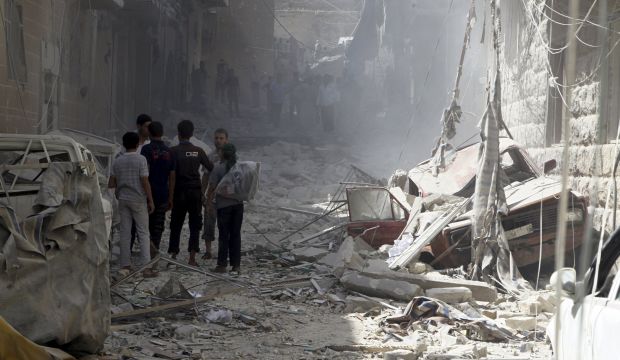
Residents inspect damage from what activists said was an airstrike by forces loyal to Syria’s President Bashar Al-Assad in Al-Ansari neighborhood of Aleppo, Syria on September 18, 2015. (Reuters/Abdalrhman Ismail)
Dmitry Peskov, the Kremlin’s spokesman, told reporters: “If there is a request (from Syria), then in the framework of a bilateral dialogue it would be, naturally, discussed and considered.”
This comes following reports that the Syrian military has recently deployed weapons newly supplied by Russia as it battles a four-year-old insurgency by mainly Islamist fighters.
Reuters news agency on Thursday quoted a Syrian military source as saying that the Syrian army has begun using new types of air and ground weapons recently supplied by Russia.
Syria’s Foreign Minister Walid Al-Mouallem told state television on Thursday that Russia had increased military supplies to the Syrian army, without elaborating on the nature of the assistance.
Mouallem said the Syrian government would consider asking Russia to send troops to fight in Syria if need arises but said there were no such troops there.
“(The Russians) have realized before others that confronting terrorism in Syria requires preemptive operations in self-defense, and therefore they have escalated the pace of supplies to our army with weapons and ammunition,” he said.
According to analysts, the Russian military assistance to Assad’s government would disrupt efforts to find a political solution to the war and would perpetuate chaos in Syria.
Fayez Sara, a member of the western-backed Syrian National Coalition, told Asharq Al-Awsat that Russia’s military intervention in Syria “undermines the political process and serves the interests of the terrorist groups that thrive on the continuation of chaos.”
“Russia’s support of a government that has lost its legitimacy due to the massacres it carried out against civilians who went out to demand freedom and dignity and its use of internationally prohibited weapons… constitutes a violation of the international law,” Sara said.
Others pointed out that Russia’s increasing military presence in Syria would “impose new rules of engagement and further partition Syria.”
In comments to Asharq Al-Awsat, Sami Nader, a professor of international relations at Beirut’s St. Joseph University, said Mouallem’s recent remarks and the Kremlin’s stance that followed “might be within the context of Moscow’s attempts… to say that it will not enter into war in Syria and that it will only establish a military zone on the Syrian coast, the government’s last stronghold.”
The Russian military buildup, Nader argued, means that Syria is heading towards further partition, with Turkey controlling the north—where it plans to establish a safe zone—, Russia the coastal areas, Iran the southwestern areas, and the rest of Syria being subject to US-led airstrikes against the Islamic State of Iraq and Syria militants.
Caroline Akoum contributed additional reporting from Beirut.
